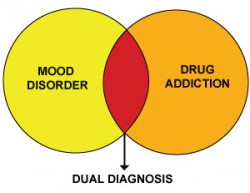Dual Diagnosis Treatment

Let us help you find dual diagnosis treatment today!
When a person is experiencing both a substance abuse problem and a mental health disorder, it is called dual diagnosis. Dual diagnosis treatment is a method to help treat the two types of problems together. This type of treatment is common because many people with one of these problems often has problems with other. This treatment will help the person overcome the disorder and substance abuse problem and be able to reclaim their life.
What comes first, substance abuse or the mental health problem?
There isn’t one correct answer to this question since either one can happen first. Sometimes the mental disorder will happen first and then it can lead the person experiencing depression, anxiety or other disorders that then lead into alcohol and drug related problems. When the alcohol or drug problem occurs first it can lead the person into emotional and mental problems.
Alcohol and drugs are used commonly to self medicate depression and or anxiety problems. The problem that the person will encounter when they self medicate with a controlled substance is that their symptoms can worsen over time. Controlled substances can push the person over the edge when something happens, big or small. Alcohol and drugs may also make the person mental health issues and symptoms much worse and trigger new symptoms. It is also common that the controlled substance can interact with medications such as antidepressants and mood stabilizer and make them less effective.
Signs and Symptoms of Common Co-Occurring Disorders
The most common problems that a person with a mental health problem may experience is depression, anxiety and bipolar disorder. When the person experiences these problems, they will typically feel helpless and hopeless. The individual may lose interest in activities they once enjoyed. Their appetite and weight may change, often rapidly. Their sleep cycle may change and cause them to lose a lot of energy.
When the person is having anxiety issues, they will typically have a lot of tension and worry more than before. It is common for them feel restless and jumpy over small situations and cause them to be a bit edgy. Muscle tension and headaches are also another sign of anxiety and other co-occurring disorders.
Dual Diagnosis Treatment Options
The best treatment option for dual diagnosis is an integrated approach. This is where the substance abuse problem and the mental disorder are treated together. When the person is going through treatment for their co-occurring problems, they can attend different types of therapy. Therapy such as individual counseling and support groups are a great method for the person to be able to work through their multiple problems. Many therapist will suggest the person go through a group that may be specialized for their substance abuse problem. For example, they could through a Alcoholics Anonymous or Narcotics Anonymous. This can gives the individual a chance to lean on others and get extra support with other people with the same type of substance abuse problem.
It is important for the person going through the treatment to know that recovery will take time but there is hope and treatment can be successful, if worked properly . Relapse is common part of the recovery process and if this occurs the individual shouldn’t get discouraged. Relapse can sometimes give the person another reason to pick up and move on with recovery. It will take hard word and set backs may happen but they will be able to move on through the recovery process.
Get Help
It is important for a person experiencing both mental health and substance abuse problems to seek dual diagnosis treatment. Treatment can help the person be able to overcome their problem and move on with their life. They should seek peer and professional support, educate themselves about dual diagnosis and to be patient during the process. Treating dual diagnosis will be an ongoing process and it is crucial that they get the help they need today.
For help finding a treatment center for you or loved one, call 1-800-943-0566
